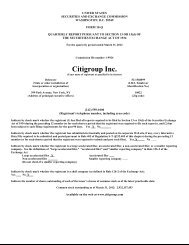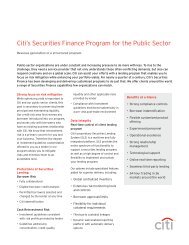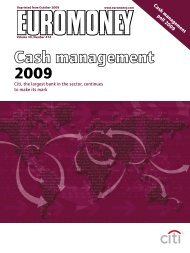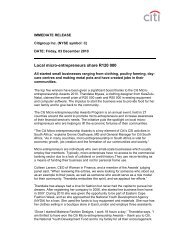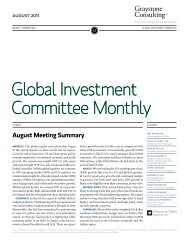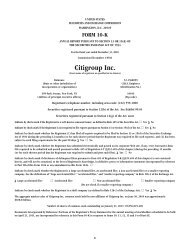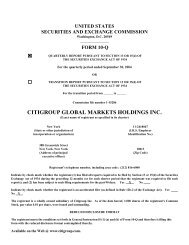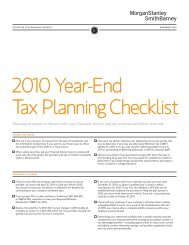FRANkLiN TEMPLETON INVESTMENT FUNDS - Citibank
FRANkLiN TEMPLETON INVESTMENT FUNDS - Citibank
FRANkLiN TEMPLETON INVESTMENT FUNDS - Citibank
You also want an ePaper? Increase the reach of your titles
YUMPU automatically turns print PDFs into web optimized ePapers that Google loves.
PROSPECTUS OF FRANKLIN <strong>TEMPLETON</strong> <strong>INVESTMENT</strong> <strong>FUNDS</strong><br />
may exceed 100% for short periods between redemption instructions and execution of the hedge trade.<br />
More details as to the rules governing allocation of assets and liabilities at a class level are contained in<br />
Appendix D.<br />
Counterparty Risk<br />
When over- the-counter (OTC) or other bilateral contracts are entered into (inter alia OTC derivatives,<br />
repurchase agreements, security lending,…) the Company may find itself exposed to risks arising from<br />
the solvency of its counterparties and from their ability to respect the conditions of these contracts. The<br />
Company is exposed to the risk that the counterparty will fail to respect its commitments under the term<br />
of each contract.<br />
Credit Risk<br />
Credit risk, a fundamental risk relating to all fixed income securities as well as money market instruments,<br />
is the chance that an issuer will fail to make principal and interest payments when due. Issuers with higher<br />
credit risk typically offer higher yields for this added risk. Conversely, issuers with lower credit risk typically<br />
offer lower yields. Generally, government securities are considered to be the safest in terms of credit risk,<br />
while corporate debt, especially those with poorer credit ratings, have the highest credit risk. Changes in<br />
the financial condition of an issuer, changes in economic and political conditions in general, or changes in<br />
economic and political conditions specific to an issuer, are all factors that may have an adverse impact on<br />
a issuer’s credit quality and security values.<br />
Credit- linked Securities Risk<br />
Credit- linked securities are debt securities that represent an interest in a pool of, or are otherwise<br />
collateralised by one or more corporate debt obligations or credit default swaps incorporated debt or<br />
bank loan obligations. Such debt obligations may represent the obligations of one or more corporate<br />
issuers. The Fund has the right to receive periodic interest payments from the issuer of the credit- linked<br />
security (usually the seller of the underlying credit default swap(s)) at an agreed- upon interest rate, and a<br />
return of principal at the maturity date.<br />
The Fund bears the risk of loss of its principal investment, and the periodic interest payments expected to<br />
be received for the duration of its investment in the credit- linked security, in the event that one or more of<br />
the debt obligations underlying the credit default swaps go into default or otherwise become non- performing.<br />
Upon the occurrence of such a credit event (including bankruptcy, failure to timely pay interest or principal,<br />
or a restructuring), the Fund affected will generally reduce the principal balance of the related credit- linked<br />
security by the Fund’s pro rata interest in the par amount of the defaulted underlying debt obligation in<br />
exchange for the actual value of the defaulted underlying obligation or the defaulted underlying obligation<br />
itself, resulting in a loss of a portion of the Fund’s investment. Thereafter, interest on the credit- linked<br />
security will accrue on a smaller principal balance and a smaller principal balance will be returned at<br />
maturity. To the extent a credit- linked security represents an interest in underlying obligations of a single<br />
corporate or other issuer, a credit event with respect to such issuer presents greater risk of loss to a Fund<br />
than if the credit- linked security represented an interest in underlying obligations of multiple issuers.<br />
In addition, the Fund bears the risk that the issuer of the credit- linked security will default or become<br />
bankrupt. In such an event, the Fund may have difficulty being repaid, or fail to be repaid, the principal<br />
amount of its investment and the remaining periodic interest payments thereon.<br />
An investment in credit- linked securities also involves reliance on the counterparty to the credit default<br />
swap entered into with the issuer of the credit- linked security to make periodic payments to the issuer<br />
under the terms of the swap. Any delay or cessation in the making of such payments may be expected in<br />
certain instances to result in delays or reductions in payments to the Fund as an investor in such creditlinked<br />
securities. Additionally, credit- linked securities are typically structured as limited recourse obligations<br />
of the issuer of such securities such that the securities issued will usually be obligations solely of the issuer<br />
and will not be obligations or responsibilities of any other person.<br />
34 Franklin Templeton Investment Funds



